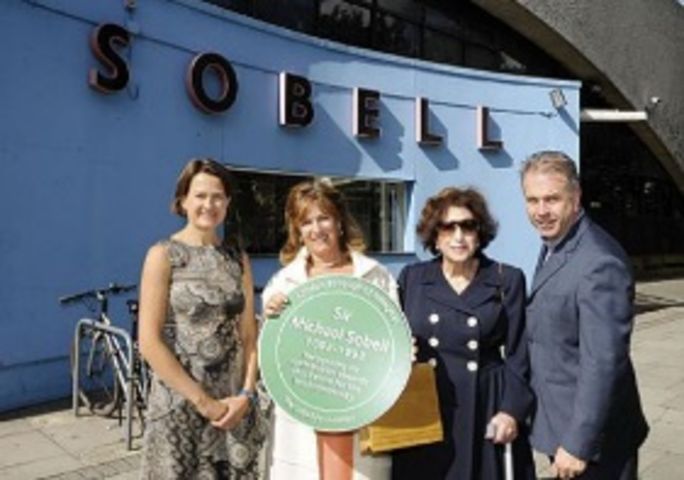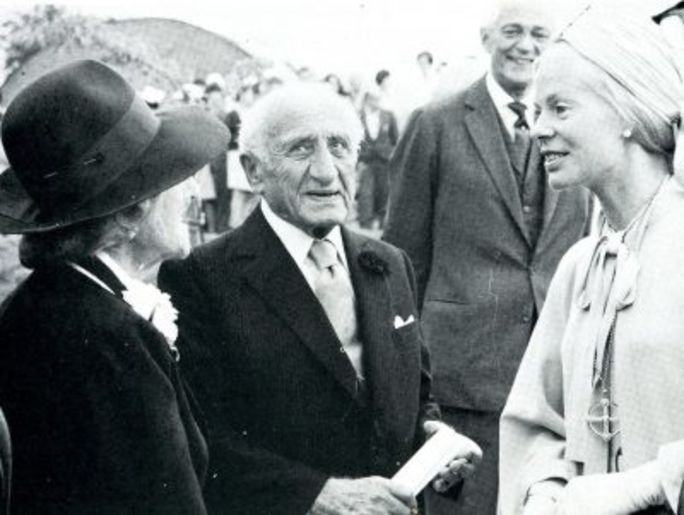The Sobell Leisure Centre and the land on which it stands was a gift to Islington’s residents from Sir Michael Sobell, a well-known philanthropist. Sir Michael kindly donated £1.1million (worth over £12million today) towards the costs of building the centre in 1973. The Variety Club of Great Britain and Islington Council also contributed to the £2million total cost. Designed without charge by the famous architectural firm Richard Seifert Partnership, the centre’s ice rink, sports hall, squash courts, gym and exercise classes attract about half a million visitors a year. It was opened in 1973 by the Duke of Edinburgh.
Opening Michael Sobell Sports Centre

The Duke of Edinburgh opens the Centre in 1973 to demonstrations over entrance charges. Since its launch the centre has become a much-valued community hub for all Islington residents and many outside of the borough, to develop a healthy sport and exercise lifestyle in a warm, inclusive and relaxing atmosphere.
Leading up to the 2010 council elections, the incumbent Liberal Democrat administration developed plans to demolish the site and replace it with a small leisure centre and housing tower blocks. Thousands of users expressed their opposition to this with a desire to retain and upgrade the existing centre. An active and successful campaign was run to retain the centre, with the full support of Islington Labour, Green and Conservative parties. Following the election, the incoming Labour administration fulfilled its pledge to refurbish the centre rather than redevelop it and in 2010 Sir Michael Sobell’s gift to the whole community of Islington was acknowledged by Islington Council unveiling a green plaque at the centre:
True Sport
Plaque tribute to philanthropist Sir Michael Sobell who donated £1.1m for much-loved sport and leisure centre. The unveiling was undertaken jointly by Cllr Catherine West and Sir Michael’s daughter, Hilda Rubin. Also shown are LBI Cllr Paul Convery and Mrs Gaie Scouller, Sir Michael Sobell's grand-daughter and a trustee of the Sobell Foundation.

The then leader of Islington Council, Councillor Catherine West (now MP for Hornsey and Wood Green) said at the unveiling: “Sir Michael Sobell’s gift made a huge difference to our residents’ lives and continues to do so today. This plaque is a way of recognising Islington’s continuing gratitude. Almost 40 years on, the Sobell Leisure Centre is one of Islington’s best-loved places and we’re committed to its future.” Sobell has since received from Islington Council £1.7million for necessary refurbishments and improvements to the building. The centre also played its part as an Olympic Training Camp for Volleyball during the 2012 Olympic Games and has recently received a facility upgrade through a Sport England grant. In 2014 the contract for the management of all Islington sport and leisure centres was awarded to Greenwich Leisure Limited who still operates it today. Despite the population of Islington declining since the centre opened (255,000 in the 1970s, 215,000 in 2015), Sobell Leisure Centre retains its popularity year on year and provides an invaluable community hub. All in Islington look forward to a bright future for Sobell.
Sobell Food Distribution Hub

More recently, the Sobell Leisure Centre was transformed into a food distribution hub during the lockdown period of the recent Covid-19 pandemic. Greenwich Leisure Limited and Islington Council worked in partnership to deliver the project which helped to provide vital food supplies to local food banks and enabled drivers to transport essential living supplies to local residents most in need. The Council received a helping hand and generous donations from a variety of sources including HI5 Church and Arsenal Football Club's players and supporters.
Pictured are the operational team with representatives from GLL and Islington Council. Also shown are Deputy Major of Islington - Cllr Troy Gallagher, Leader of the Council - Cllr Richard Watts and Cllr Una O’Halloran who visited to pay tribute and thanks to all of the staff involved.
Who is Sir Michael Sobell?
Michael Sobell, son of Lewis and Esther Sobell was born in Austria on 1st November 1892. The family migrated to England before the turn of the century and young Michael was educated at the Central London Foundation School. He started in the business by trading in leather goods but soon moved into the electrical business as a small importer of refrigerators and other (at the time) novel domestic appliances from the USA.

As demand for Sobell’s electrical equipment rose sharply during the 1930s, he raised finance to start manufacturing of refrigerators, radios and radiograms at Stonebridge Park, North London. In the late 1930s, due to extreme economic depression, many of Sobell’s employees originated from the Rhondda Valley in South Wales. During the Second World War, bombing prompted him to move production of electronic equipment for the armed forces to Amersham, Buckinghamshire. After the war, he opened a large factory in the Rhondda Valley manufacturing radios and televisions, employing up to 3,000 people. His company, Sobell Industries, was sold to EMI in 1954. In 1961, Sobell’s company was bought by GEC through a reverse takeover, a tie-up which netted Sobell a substantial sum which would form the foundation of his charitable trusts. The Sobell Foundation was formed in 1962.
Sir Michael was President of the National Society for Cancer Relief and played an active personal role in the Sobell Foundation’s charitable work, dispensing millions of pounds to a range of causes such as cancer relief and research, Anglo- Jewish charities, Sobell sports centres in South Wales and Islington and the London Zoo’s pavilions for apes and monkeys, built-in 1973. He also endowed the department of neurophysiology at the National Hospital for Nervous Diseases and the gastrointestinal unit at Wexham Park Hospital in Slough. Funds from the Sobell Foundation enabled the opening of Michael Sobell Hospice in 1977.
Sir Michael was a great follower of the turf and bought his first racehorse in 1957 in partnership with Arnold Weinstock. They were advised by the great jockey and trainer, Sir Gordon Richards, who later became their racing manager. They had a string of winners including the Derby winner Troy, whose earnings for 1979 were a record to that date for any horse trained in the UK.
Sir Michael was knighted for his charitable activities in the New Year’s Honours List of 1972. He was a man with many friends, a good employer with an impulsive generosity despite his unflagging drive and tough commercial attitudes. He was full of curiosity all his life, with a strong sense of public and religious duty. He was a freeman of the Carmen Company, a Livery Company of the City of London and was an honorary fellow of the Royal College of Pathologists.
Sir Michael's wife Anne died in 1988. Sir Michael died in 1993, aged 100. He was survived by his two daughters, Lady Weinstock and Mrs Hilda Rubin, who performed the opening ceremony at the opening of the Michael Sobell Centre on 21 September 2005.









